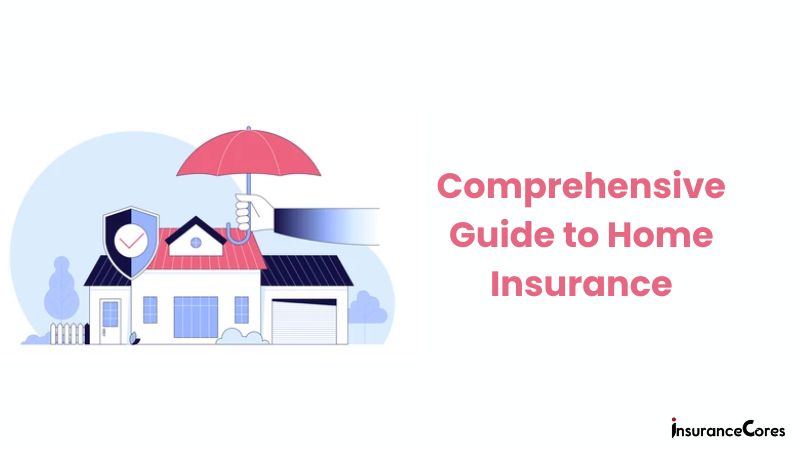In today’s uncertain world, protecting your home and belongings is paramount. Home insurance serves as a safety net, offering financial protection in the event of unforeseen disasters or accidents. However, navigating the complexities of home insurance can be overwhelming. This comprehensive guide aims to demystify home insurance, providing American homeowners and renters with the knowledge they need to make informed decisions about their coverage.

What is Home Insurance?
Home insurance, also known as homeowner’s insurance or property insurance, is a type of insurance policy that provides financial protection to homeowners or renters in the event of damage to their property or belongings. It typically covers damage caused by perils such as fire, theft, vandalism, and natural disasters, as well as liability for accidents that occur on the property.
Types of Home Insurance Coverage
There are several types of coverage offered by home insurance policies, including:
- Dwelling coverage: This protects the structure of your home, including the walls, roof, and foundation, from covered perils.
- Personal property coverage: This covers your belongings, such as furniture, clothing, and electronics, in the event of theft, damage, or destruction.
- Liability coverage: This provides financial protection if someone is injured on your property and decides to sue you for damages.
- Additional living expenses coverage: Also known as loss of use coverage, this reimburses you for expenses incurred if you’re unable to live in your home due to covered damage.
Benefits of Home Insurance
Home insurance offers a range of benefits to homeowners and renters, including:
- Financial protection: Home insurance provides peace of mind by protecting your investment in your home and belongings.
- Liability coverage: It safeguards you from legal expenses and damages if someone is injured on your property.
- Mortgage requirement: Most mortgage lenders require homeowners to have home insurance as a condition of the loan.
- Coverage for personal belongings: Home insurance can help replace or repair your belongings in the event of theft, fire, or other covered perils.
- Additional living expenses: If your home becomes uninhabitable due to covered damage, home insurance can cover temporary living expenses, such as hotel bills and food costs.
Factors Affecting Home Insurance Premiums
Several factors can influence the cost of home insurance premiums, including:
- Location: The location of your home plays a significant role in determining your insurance premiums, with factors such as proximity to fire stations, crime rates, and weather patterns taken into account.
- Property value and rebuilding costs: The value of your home and the cost to rebuild it in the event of a total loss will impact your premiums.
- Deductible amount: A higher deductible typically results in lower premiums, but it also means you’ll pay more out of pocket in the event of a claim.
- Age and condition of the home: Older homes or those in poor condition may cost more to insure due to the increased risk of damage.
- Protective devices: Installing security systems, smoke detectors, and other protective devices can lower your insurance premiums by reducing the risk of theft or damage.
How to Choose the Right Policy?
When selecting a home insurance policy, it’s essential to consider your specific needs and circumstances. Here are some tips for choosing the right policy:
- Assess your coverage needs: Evaluate the value of your home and belongings, as well as your potential liability risks, to determine the appropriate level of coverage.
- Compare quotes: Obtain quotes from multiple insurance companies to compare coverage options and premiums.
- Understand policy exclusions: Be aware of any exclusions or limitations in your policy, such as coverage for certain types of damage or personal property.
- Review deductibles: Consider your financial situation and risk tolerance when choosing a deductible amount.
- Seek discounts: Inquire about discounts for factors such as bundling multiple policies, installing protective devices, or having a good claims history.
Tips for Saving on Home Insurance
While home insurance is essential for protecting your investment, there are ways to save money on premiums:
- Increase your deductible: Opting for a higher deductible can lower your premiums, but be sure you can afford to pay the deductible in the event of a claim.
- Bundle policies: Many insurance companies offer discounts for bundling home and auto insurance policies.
- Improve home security: Installing security systems, smoke detectors, and deadbolt locks can reduce the risk of theft and lower your premiums.
- Maintain a good credit score: Some insurers use credit scores to determine premiums, so maintaining a good credit score can help you qualify for lower rates.
- Review your policy annually: Regularly review your policy to ensure you have adequate coverage and take advantage of any available discounts.
Frequently Asked Questions (FAQs) on Home Insurance
Q: Is home insurance required by law?
Q: What does home insurance typically cover?
Q: How much home insurance do I need?
Q: Can I adjust my coverage over time?
Must Read:
- Earthquake Insurance: A Comprehensive Guide for American Homeowners
- Renters Insurance: Protecting Your Home and Peace of Mind
Conclusion
Home insurance is a vital tool for protecting your home, belongings, and finances against unforeseen disasters and accidents. By understanding the different types of coverage, factors affecting premiums, and tips for choosing the right policy, homeowners and renters can make informed decisions to ensure they have adequate protection. Remember to review your policy annually and explore ways to save on premiums while maintaining comprehensive coverage.
In conclusion, investing in home insurance provides peace of mind and financial security, allowing you to focus on enjoying your home without worrying about what might happen.